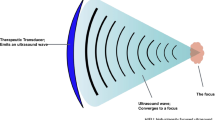Abstract
Purpose
To compare the survival benefit and safety of the low power cumulative and traditional high intensity focused ultrasound (HIFU) for locally advanced pancreatic cancer.
Method
We retrospectively analyzed 38 patients with locally advanced, inoperable, stage III pancreatic patients received HIFU treatment between January 2008 and April 2014 in the Department of Surgery, the Second Affiliated Hospital, Zhejiang University, School of Medicine. 11 of them received the low power cumulative HIFU treatment, while other 27 received the traditional HIFU treatment. The HIFU device used was the FEP-BY02 (Yuande Biomedical Engineering Co. Ltd, Beijing, China). Serum biochemistry and adverse events were assessed before and after treatment. All the patients were followed up until death. The survival rate and adverse events of two groups were compared.
Results
In 38 patients, the baseline characteristics including gender, age, Karnofsky performance status (KPS) score, tumor location of two groups were generally well balanced (P > 0.05). The median overall survival (OS) for low power cumulative HIFU group was 10.3 months (95% CI, 6.3–14.3 months), which is significantly longer than traditional HIFU group with 6.0 months (95% CI, 5.2–6.8 months) (P = 0.018). In low power cumulative HIFU group, the 6-month and 12-month survival rates were higher than traditional group, 100% v.s 44.4%, 11.1% v.s 36.4%, respectively. The adverse events in both groups include abdominal pain, fever, C-reactive protein (CRP) elevated. The incidence was lower in low power cumulative HIFU group, however, without statistical significance.
Conclusion
The low power cumulative HIFU treatment showed a statistical significance in survival benefit with better safety profile compared to the traditional HIFU treatment in patients with locally advanced pancreatic cancer.


Similar content being viewed by others
References
Abadi D, Zderic V (2011) Ultrasound-mediated nail drug delivery system. J Ultrasound Med Off J Am Inst Ultrasound Med 30:1723–1730
Burris HA 3rd et al (1997) Improvements in survival and clinical benefit with gemcitabine as first-line therapy for patients with advanced pancreas cancer: a randomized trial. J Clin Oncol Off J Am Soc Clin Oncol 15:2403–2413
Chen W, Zheng R, Zuo T, Zeng H, Zhang S, He J (2016) National cancer incidence and mortality in China, 2012. Chin J Cancer Res Chung-kuo yen cheng yen chiu 28:1–11. doi:10.3978/j.issn.1000-9604.2016.02.08
Conroy T et al (2011) FOLFIRINOX versus gemcitabine for metastatic pancreatic cancer. N Engl J Med 364:1817–1825. doi:10.1056/NEJMoa1011923
Heestand GM, Murphy JD, Lowy AM (2015) Approach to patients with pancreatic cancer without detectable metastases. J Clin Oncol off J Am Soc Clin Oncol 33:1770–1778. doi:10.1200/JCO.2014.59.7930
Hu X et al (2013) New clinical application of high-intensity focused ultrasound: local control of synovial sarcoma. World J Surg Oncol 11:265. doi:10.1186/1477-7819-11-265
Kennedy JE (2005) High-intensity focused ultrasound in the treatment of solid tumours. Nature Rev Cancer 5:321–327. doi:10.1038/nrc1591
Kim SH, Jung SE, Kim HL, Hahn ST, Park GS, Park WC (2010) The potential role of dynamic MRI in assessing the effectiveness of high-intensity focused ultrasound ablation of breast cancer. Int J Hyperth Off J Eur Soc Hyperth Oncol North Am Hyperth Group 26:594–603. doi:10.3109/02656736.2010.481275
Li JJ, Xu GL, Gu MF, Luo GY, Rong Z, Wu PH, Xia JC (2007) Complications of high intensity focused ultrasound in patients with recurrent and metastatic abdominal tumors. World J Gastroenterol 13:2747–2751
Orsi F, Arnone P, Chen W, Zhang L (2010) High intensity focused ultrasound ablation: a new therapeutic option for solid tumors. J Cancer Res Ther 6:414–420. doi:10.4103/0973-1482.77064
Schmitz AC, Gianfelice D, Daniel BL, Mali WP, van den Bosch MA (2008) Image-guided focused ultrasound ablation of breast cancer: current status, challenges, and future directions. Eur Radiol 18:1431–1441. doi:10.1007/s00330-008-0906-0
Su D, Jiao SC, Wang LJ, Shi WW, Long YY, Li J, Bai L (2014) Efficacy of nimotuzumab plus gemcitabine usage as first-line treatment in patients with advanced pancreatic cancer. Tumour Biol J Int Soc Oncodevelopmental Biol Med 35:2313–2318. doi:10.1007/s13277-013-1306-x
Sung HY et al (2011) Long-term outcome of high-intensity focused ultrasound in advanced pancreatic cancer. Pancreas 40:1080–1086. doi:10.1097/MPA.0b013e31821fde24
ter Haar G (1995) Ultrasound focal beam surgery. Ultrasound Med Biol 21:1089–1100
Von Hoff DD et al (2013) Increased survival in pancreatic cancer with nab-paclitaxel plus gemcitabine. N Engl J Med 369:1691–1703. doi:10.1056/NEJMoa1304369
Wei Q, Yu W, Rosati LM, Herman JM (2015) Advances of stereotactic body radiotherapy in pancreatic cancer. Chin J Cancer Res Chung-kuo yen cheng yen chiu 27:349–357. doi:10.3978/j.issn.1000-9604.2015.04.12
Wu F (2014) High intensity focused ultrasound: a noninvasive therapy for locally advanced pancreatic cancer. World J Gastroenterol 20:16480–16488. doi:10.3748/wjg.v20.i44.16480
Wu F, Chen WZ, Bai J, Zou JZ, Wang ZL, Zhu H, Wang ZB (2001) Pathological changes in human malignant carcinoma treated with high-intensity focused ultrasound. Ultrasound Med Biol 27:1099–1106
Wu F, Wang ZB, Cao YD, Chen WZ, Bai J, Zou JZ, Zhu H (2003) A randomised clinical trial of high-intensity focused ultrasound ablation for the treatment of patients with localised breast cancer. Br J Cancer 89:2227–2233. doi:10.1038/sj.bjc.6601411
Zhang L, Wang ZB (2010) High-intensity focused ultrasound tumor ablation: review of ten years of clinical experience. Front Med China 4:294–302. doi:10.1007/s11684-010-0092-8
Zhou Y (2014) High-intensity focused ultrasound treatment for advanced pancreatic cancer. Gastroenterol Res Pract 2014:205325. doi:10.1155/2014/205325
Author information
Authors and Affiliations
Corresponding authors
Ethics declarations
Funding
This study was funded by National Natural Science Foundation of China (81201640); Zhejiang Provincial Natural Science Foundation of China (LY16H160026).
Conflict of interest
All the Authors declare that there are no conflicts of interest.
Ethical approval
All procedures performed in studies involving human participants were in accordance with the ethical standards of the ethics committee of the Second Affiliated Hospital, Zhejiang University, School of Medicine.
Informed consent
Informed consent was obtained from all individual participants included in the study.
Rights and permissions
About this article
Cite this article
Zhao, J., Zhao, F., Shi, Y. et al. The efficacy of a new high intensity focused ultrasound therapy for locally advanced pancreatic cancer. J Cancer Res Clin Oncol 143, 2105–2111 (2017). https://doi.org/10.1007/s00432-017-2459-6
Received:
Accepted:
Published:
Issue Date:
DOI: https://doi.org/10.1007/s00432-017-2459-6




